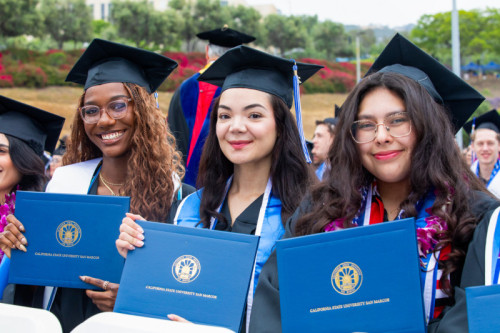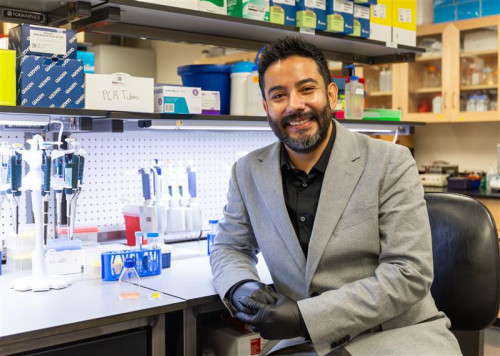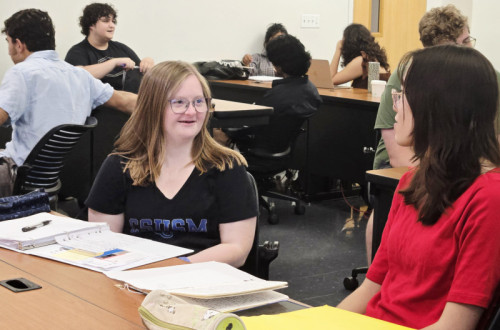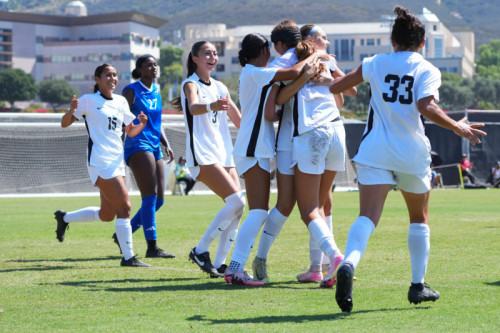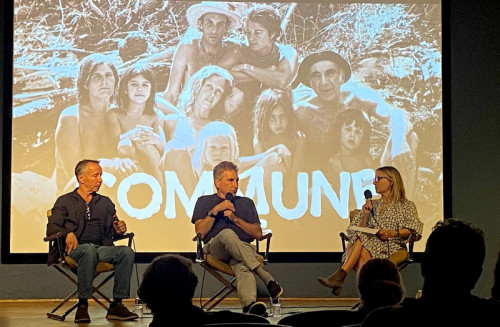CSUSM Among Top Schools in Washington Monthly Rankings
Latest News Release
- Civil Rights Office Offering Enhanced Reporting ToolsOur Title IX/DHR office is enhancing how cases of discrimination, harassment, and retaliation are managed. While your role in supporting students and colleagues remains unchanged, these improvements mean a better experience for those who seek help. What you need to know: Students and employees can continue to report concerns in the same way Confidentiality and support remain our top priorities Reports you refer will be handled faster and more consistently Our office can provide clearer updates and resources throughout the process Why This Matters: Case handling will be more efficient and less burdensome for staff Compliance and reporting are strengthened with automated workflows Secure sharing improves collaboration across the right stakeholders Real-time insights help resolve cases more quickly Reporting channels remain the same. If a student or colleague seeks guidance, please continue to refer them to https://www.csusm.edu/title9/.
- Civil Rights Office Offering Enhanced Reporting ToolsWe are enhancing how our Civil Rights office manages reports of discrimination, harassment, or retaliation. While the way you submit a report will remain the same, our team will now have better tools to support you. What this means for you: Faster response times – cases will move more quickly through the process Consistency across CSU – you’ll receive the same high-quality support no matter your campus Confidentiality and trust – reports are handled securely and with care Clearer communication – our office can keep you better informed about resources and next steps Your voice matters, and we want to ensure you feel supported throughout the process. To learn more about reporting and resources, visit https://www.csusm.edu/title9/.
- Biology Professor Researching Breast CancerCarlos Luna Lopez’s typical day in the lab looks a little different from others. Dark, cool and full of machinery like 3D bio printers, the lab is home to petri dishes full of cancerous cells. Inspired by one of his students, his lab cohort is studying breast cancer. “Being in Dr. Luna’s lab has been such a great experience. He’s not only an amazing PI, but also a really great mentor,” said Oscar Loyola Torres, a molecular and cellular biology student. Dr. Luna, a biology professor at Cal State San Marcos, received his bachelor’s in physics from Universidad de Sonora in Mexico and his Ph.D. in bioengineering from the University of Maryland. He decided to pursue his postdoctoral research closer to his parents who live in Mexico, which brought him to the University of California San Diego. Dr. Luna always knew he wanted to pursue a career in the STEM field as his father is a mechanical engineer and his mother a nurse. During his Ph.D. studies, he joined the Summer Program in Neuroscience, Excellence and Success (SPINES) where he met a former CSUSM biology professor who further inspired his move to San Diego and his pursuit of a job at CSUSM. Dr. Luna believes that finding a good balance between research and teaching is important. He explained that one of his biophysics professors would play soccer with his students and invite them to important seminars, creating a meaningful relationship with the students beyond just the research. So when he was told of the community between faculty and students at CSUSM, it felt like the right choice to apply. Dr. Luna has taught upper division cellular and molecular biotechnology classes as well as bio statistics and bioengineering classes at CSUSM since 2017. He also occasionally teaches advanced molecular seminars, and currently he and his lab students are studying the effects of fat cells on breast cancer growth. The tests examine how lipid metabolism is driving parts of cancer growth. Lipid metabolism is the process of creating or breaking down lipids (fats) to help with energy storage, structural cell membrane support and cell signaling. Since breast tissue is full of lipids, it creates the perfect environment for cancer cells to thrive utilizing these functions to their advantage. Dr. Luna and his students monitor the interactions between cancer cells and two different types of fat cells, white and brown adipocytes. These cells work to store energy, produce hormones and regulate body temperature, all basic functions crucial to the success of the human body. Utilizing his background in engineering, Dr. Luna and his students built a device that creates spheroids, 3D circular clusters of cells. The spheroid is made of biomaterials replicating human tissue, allowing the students to get the most accurate results from their cancer research. “There are so many things I get to learn from him and the lab that are helping me grow as both a student and a future physician,” Loyola Torres said. Dr. Luna said this is only a portion of what their research encapsulates. Every time a new discovery is made it opens a door for further questioning, and the research continues. “When you have something in your mind, and you get the chance and the resources to be able to put that into the world it’s so exciting,” Dr. Luna said. Dr. Luna loves watching his students grow and be creative as it reminds him of when he was a kid. Not only does he get to exercise his own creativity, but he gets to bring his students along for the journey. Having watched some of them grow from first years to graduating Ph.D. students, the relationship Lopez has been able to create with his students makes his job all the more rewarding. Media Contact Eric Breier, Interim Assistant Director of Editorial and External Affairs ebreier@csusm.edu | Office: 760-750-7314
- Aspiring Scholars Receives More Than $2.5M to Expand ProgramCal State San Marcos has received three grants totaling more than $2.5 million to support the continued development and expansion of a program that gives students with intellectual disabilities an inclusive college experience. The grant funding will build on the early success of the Aspiring Scholars program, which was launched in 2023 by CSUSM education professor Rebecca Brooks. Now in its third year, the program has grown from four students to 19, offering them an opportunity to learn and grow in the CSUSM community while earning a certificate in higher education academic and career studies. The largest of the grants is $2.44 million over five years from the Transition and Post-Secondary Programs for Students with Intellectual Disabilities (TPSID) in the U.S. Department of Education. Brooks is the principal investigator, with psychology professor Allison Jobin as the co-PI. The pair also secured grants of $75,000 from the California Center for Inclusive College and $50,000 from the CSU Commission on Professional and Continuing Education. “Seeing my dream for this program, and for our students, come to life through the collaborative efforts of our incredible CSUSM community has meant the world to me,” Brooks said. The new funding will enable Aspiring Scholars to hire its first full-time staff members, secure dedicated campus space, increase its support and training to peer mentors and professors, enhance student support, and obtain essential materials for daily operations, program orientations and events. The program is built on four core pillars: Academics: College courses aligned with students’ interests and career goals Internships: Career development and employment readiness Life skills: Fostering independence and self-advocacy Campus life and student engagement: Supporting full participation in campus life This semester, Aspiring Scholars welcomed its third cohort of 10 students, raising the total to 19. The program has collaborated with nearly 70 faculty members, and the number of peer mentors (CSUSM students who provide essential one-on-one support) has increased from a dozen in 2023 to an average of 60 per semester. The program recently launched on-campus internships for students. Among the internship sites are the Kellogg Library, Cougar Pantry, Center for Children and Families, Campus Recreation, Innovation Hub, and Office of Recruitment & Outreach. Additionally, Aspiring Scholars has been recognized as a Comprehensive Transition Postsecondary (CTP) Program, allowing participants to apply for federal student aid. “Our ultimate goal is to build a sustainable, long-term program that continues to evolve and thrive,” Brooks said. The application period for the fall 2026 cohort opened Oct. 1 and will close Nov. 30. The first class will graduate in May 2027. Media Contact Brian Hiro, Communications Specialist bhiro@csusm.edu | Office: 760-750-7306
- Women's Soccer Team Finishes Nonconference Play With WinDanielle Paulson's goal in the 78th minute was the difference as the Cal State San Marcos women's soccer team beat visiting Cal State San Bernardino 1-0 in its final nonconference game of the season Sunday. Paulson scored on an assist from her sister, Natalie Paulson. The Cougars, who finished nonconference play with a 3-1-2 record, open the California Collegiate Athletic Association portion of their schedule on Friday at Cal Poly Humboldt. Media Contact Eric Breier, Interim Assistant Director of Editorial and External Affairs ebreier@csusm.edu | Office: 760-750-7314
- Professor Goes on Tour for 20th Anniversary of Acclaimed FilmWhen Jonathan Berman came to Cal State San Marcos as a film professor in 2004, he was close to finishing a documentary about a Northern California commune during the counterculture era. The documentary was released the following year. Now, 20 years later, Berman is marking the anniversary of the film with a new digital restoration and a national tour of screenings and interviews. “Commune” is about an intentional community called Black Bear Ranch formed in 1968 in remote Siskiyou County just south of the Oregon border. A dozen people were expected to live there, but the number eventually swelled to 100 in what was a utopian experiment that attracted anarchists, hippies and activists seeking to get away from America and create something new. The documentary includes prominent actor Peter Coyote, who once lived at Black Bear. At the time of its release, “Commune” received positive reviews from such outlets as the New York Times, Variety, the Village Voice and the San Francisco Chronicle. It boasts a rating of 96% on Rotten Tomatoes. Berman says he decided to restore the film so that it would be suitable to appear on streaming services and that he chose to embark on a nationwide tour to give fans “the communal experience of theatrical.” The tour began in May in upstate New York and will end this month back in New York. In September, it made four stops in California, including Los Angeles and the Bay Area town of San Rafael, where some former Black Bear denizens reside. “Twenty years later, it is a warm feeling to reunite with those folks,” Berman said. “They have almost all gone on to do work that helps people; some of this can be gleaned in the film. It was almost like reuniting with relatives after a long time. I felt a little guilty for not really being in touch more, but then happy to see them again.” In addition to the 16 theaters that have screened “Commune,” Berman has been interviewed on nearly 20 podcasts. He’s hoping to add a few more showings in Southern California, including at least one in the San Diego area. After making “Commune,” Berman focused on teaching and consulting on other films before the release in 2018 of “Calling All Earthlings,” which examines California’s UFO counterculture cult and the Integratron, a mysterious structure in the desert north of Joshua Tree National Park. He’s now working on the third documentary in what he calls his California trilogy; titled “Gondola,” it’s about the controversial plan to build an aerial tram from Union Station to Dodger Stadium in L.A. Berman says his film work over the years has benefited greatly from the contributions of CSUSM students and fellow faculty members, from serving internships to watching and giving feedback on test edits. “That’s part of our mission as a university, for students to work intimately with teachers who are active in their field,” he said. Media Contact Brian Hiro, Communications Specialist bhiro@csusm.edu | Office: 760-750-7306



